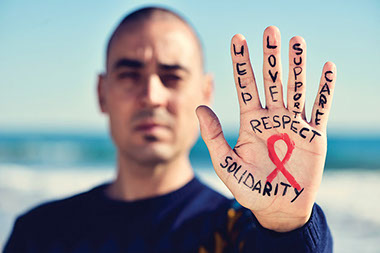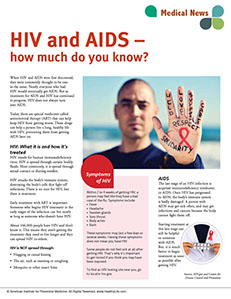MEDICAL NEWS
HIV and AIDS – how much do you know?

When HIV and AIDS were first discovered, they were commonly thought to be one in the same. Nearly everyone who had HIV would eventually get AIDS. But as treatment for AIDS and HIV has continued to progress, HIV does not always turn into AIDS.
Today, there are special medicines called antiretroviral therapy (ART) that can help keep HIV from getting worse. These drugs can help a person live a long, healthy life with HIV, preventing them from getting AIDS later on.
HIV: What it is and how it’s treated
HIV stands for human immunodeficiency virus. HIV is spread through certain bodily fluids. Most commonly, it is spread through sexual contact or sharing needles.
HIV attacks the body’s immune system, destroying the body’s cells that fight off infections. There is no cure for HIV, but there is treatment.
Early treatment with ART is important. Someone who begins HIV treatment in the early stages of the infection can live nearly as long as someone who doesn’t have HIV.
About 166,000 people have HIV and don’t know it. This means they aren’t getting the treatment they need to live longer and they can spread HIV to others.
HIV is NOT spread through:
• Hugging or casual kissing
• The air, such as sneezing or coughing
• Mosquito or other insect bites
Symptoms of HIV
Within 2 to 4 weeks of getting HIV, a person may feel like they have a bad case of the flu. Symptoms include:
• Fever
• Headache
• Swollen glands
• Sore throat
• Body aches
• Rash
These symptoms may last a few days or several weeks. Having these symptoms does not mean you have HIV.
Some people do not feel sick at all after getting HIV. That’s why it’s important to get tested if you think you may have been exposed.
To find an HIV testing site near you, go to locator.hiv.gov.
AIDS
The last stage of an HIV infection is acquired immunodeficiency syndrome, or AIDS. Once HIV has progressed to AIDS, the body’s immune system is badly damaged. A person with AIDS may get sick often, and may get infections and cancers because the body cannot fight them off.
Starting treatment at this late stage can still be helpful to someone with AIDS. But, it is much better to begin treatment as soon as possible after getting HIV.
Sources: HIV.gov and Centers for Disease Control and Prevention

Download an offline pdf file.
MEDICAL NEWS ARTICLES
<
>
2021 © American Institute for Preventive Medicine - All Rights Reserved. Disclaimer | www.HealthyLife.com








